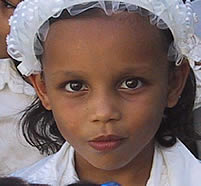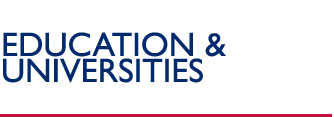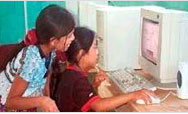 |
|
 |
 |
 |
 |

- Global Learning Portal
An internet interactive space for educators, education institutions, and government to work together to solve education challenges
- EdData II
Provides survey expertise to help assess education status and to design methods for improvement
- EQUIP 123
USAID’s Educational Quality Improvement Program
- Global Education Database
A repository of international education statistics compiled from the UNESCO Institute for Statistics and the Demographic and Health Surveys (DHS)
|
|
 |
 |
|
 |
 |
|
Basic Education
 USAID’s Basic Education Program supports host country efforts to provide equitable access to quality basic education at the pre-primary, primary, and secondary levels. Teacher training for these levels, as well as training in literacy, numeracy and other basic skills for adults and out-of-school youth, are also important elements this program. USAID’s Basic Education Program supports host country efforts to provide equitable access to quality basic education at the pre-primary, primary, and secondary levels. Teacher training for these levels, as well as training in literacy, numeracy and other basic skills for adults and out-of-school youth, are also important elements this program.
Specifically, USAID’s basic education activities are targeted to:
- Increase the number of children receiving quality educational programming, in both in and out of school settings. USAID education programs in Peru, Zambia, Morocco, Egypt, and Indonesia are examples of the wide array of efforts that USAID supports to improve the access to quality basic education.
- Increase the number of teachers with improved pedagogical techniques and skills. USAID’s Centers for Excellence in Teacher Training (CETT) works in Latin America and the Caribbean to improve the quality of classroom reading instruction in grades 1-3, with emphasis on poorer countries and disadvantaged communities. USAID’s Africa Education Initiative seeks to develop, promote, and expand innovative methods for training of more than 900,000 teachers and administrators to improve the quality of learning for millions of African children
- Raise the quality and relevancy of curricula and teaching materials. USAID’s Global Learning Portal allows teachers worldwide to share teaching materials and quality educational resources online
- Provide education policy makers with access to more education data and indicators. USAID’s EdData II Project, with its support for data collection on education policies and programs worldwide and for assessments such as the Early Grade Reading Assessment, and the Education and Policy Data Center provide developing countries with critical information and data for education policy and program planning
- Improve policies and resource allocation by governments to basic education
- Promote community involvement in schools.USAID efforts in Pakistan offer an example of involving local communities in school improvements that have led to significant improvements in secondary schools for girls
- Help more children and teachers use education technology for improved learning. USAID support for education activities under the dot-COM Alliance are aimed at improving quality, expand access, and enhance equity of education systems through carefully planned applications of digital and broadcasting technologies.
All of USAID’s basic education activities place special emphasis of all basic education activities is improving opportunities for girls, women and other underserved and disadvantaged populations. In postconflict settings, such as Afghanistan and Iraq, USAID works to reopen schools and to keep them functioning, helping to establish credibility and legitimacy of new governments.
USAID is an active participant in Education for All (EFA), a multi-donor commitment to provide quality basic education for all, and the EFA Fast Track Initiative, a global partnership between donor and developing countries to ensure accelerated progress towards achieving quality universal primary education.
Back to Top ^ |


